On the Road – Into the South
Big Heart OK to Ozark Country
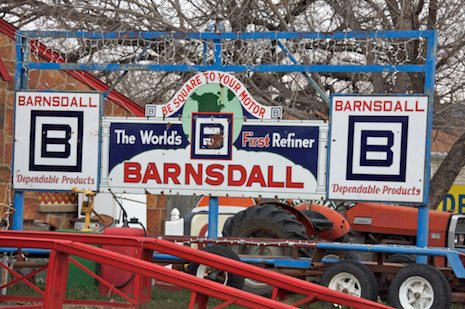
Surprisingly, just as I’ve gotten fairly close to the larger cities I’ve lost my Internet connection and haven’t had one for several days so I’m getting much further along on the road than my stories would indicate.
The next morning after my somewhat unnerving trips through Greensburg, Kansas I’m feeling more comfortable than I was just a half day ago. But that may just be due to the fact that tornadoes aren’t morning phenomena. However, that may not be true later in the day. A bit past Wichita I turn south on a local road small enough that it doesn’t even have a state designation. Within minutes I’m crossing out of Kansas and into the eastern end of Oklahoma.
Almost without notice the geography has changed: what were small dips and gentle knolls in Kansas are turning into larger hills and deeper dips. I’m edging my way into the Ozarks, through towns such as Newkirk, Ponca City and Pawhuska. The driving is easy with little traffic on the road and the hills and valleys picturesque.
The towns are equally picturesque, small towns that comprise a main street that consists of two or three blocks of century (or more) old stone and brick buildings. I hadn’t really thought about it much while passing through it, but the plains aren’t my “cup of tea”. I like landscapes that have a backdrop, something other than distant horizons that seem to fade into nothingness.
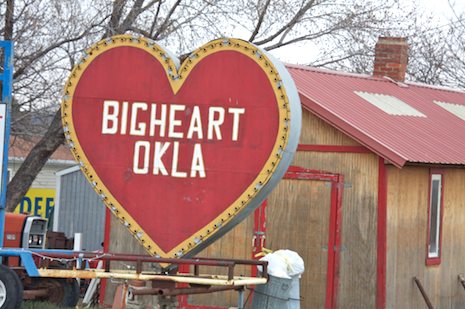
Just below a tiny town by the name of Pawhuska I diagonal southeast towards Tulsa through Barnsdall, Oklahoma, through what I discover as I drive into town is Big Heart Country. It’s also a former home of Clark Cable (and Anita Bryant too) as well as the only place you can find a functioning oil well set smack dab in the middle of a residential street. Though I’m still out in the middle of the Ozarks I’m also firmly entrenched in big oil country. Barnsdall, apparently, is the home of the world’s first oil refinery.
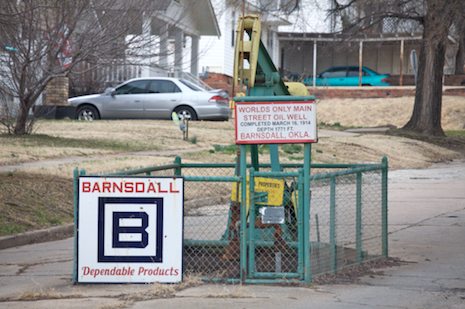
Tulsa is what all big cities are: a mess of freeways that weave in and out of a mass of concrete, tall buildings, new home developments – in short making up for what it lacks in character with an abundance of activity. It could be placed most anywhere and I’m not sure you could tell much difference.
Just as much as I was reluctant to leave Big Heart, OK I’m happy to be through Tulsa and back into the rolling countryside. From there I’m on to Fayetteville, Arkansas, home of the Razorbacks and gateway to the Ozark Mountains. Set along the banks of the White River and surrounded by forested hillsides, Fayetteville is a beautiful city, one that I’d be proud to call my home. With a population of about 70,000 it has become a thriving metropolitan community while at the same time retaining its mountain character.
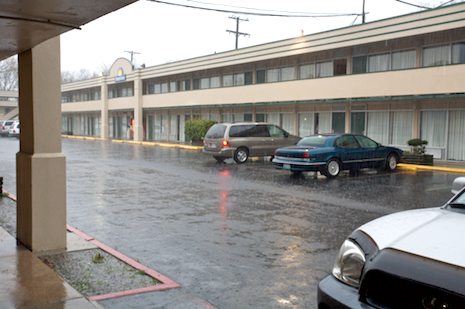
I’d love to explore but the rain is back, coming down with an increasing ferocity. I’d checked into a motel and done what is now becoming a daily thing – checking the Weather Channel. Bad news. The forecast is for heavy rain throughout the night and all day tomorrow. A second tornado has hit the Atlanta area, this time killing one person and there are tornado watches in effect in the towns on both sides of me. I’ve grown accustomed also to requesting a ground floor room and only stopping at motels with at least one floor above me. From everything I can see on the news, it’s the top floor that gets hammered the most.
I also make the decision to stay over another night. I’m far enough along to spare a day and driving through the Ozarks in pouring rain doesn’t sound like fun. Throughout the evening the Weather Channel continues to focus right on the area where I’m staying. It appears the storm track is coming up out of the Gulf of Mexico, across Texas where daytime temperatures accentuate the intensity of the thunderstorms, and then is heading straight up the Mississippi Valley into eastern Oklahoma, western Arkansas and southern Missouri. The prediction is for 6-8 inches of rain where I am with up to 15″ in the city of Cape Girardeau, Missouri. Looking it up on Google maps I discover it isn’t too far north of where I plan on crossing the Mississippi River near Charleston.
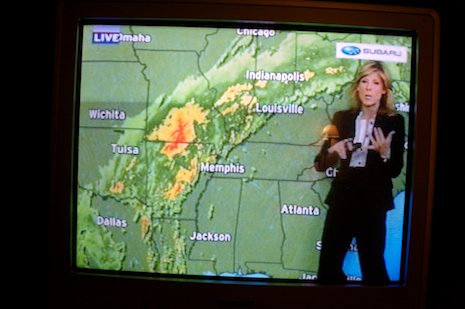
The next day the rain continues to come down in the proverbial buckets, never stopping the entire day. What this means is that I’m still in the motel at mid morning when Barack Obama makes The Speech. I find the words powerful, especially these:
This was one of the tasks we set forth at the beginning of this campaign to continue the long march of those who came before us, a march for a more just, more equal, more free, more caring and more prosperous America. I chose to run for the presidency at this moment in history because I believe deeply that we cannot solve the challenges of our time unless we solve them together unless we perfect our union by understanding that we may have different stories, but we hold common hopes; that we may not look the same and we may not have come from the same place, but we all want to move in the same direction towards a better future for of children and our grandchildren.
Toward a More Perfect Union.
It is ironic, perhaps, that just fifty years ago, in the nearby city of Little Rock, that President Dwight Eisenhower was forced to send in federal troops so that nine black students (who would subsequently become known as the Little Rock Nine) would be able to attend Central High School. After the landmark Brown v. the Board of Education decision by the Supreme Court in 1954 that proclaimed “separate but equal” education by its very nature is not equal, the slow process of desegregating the schools began.
But when the school opened right after Labor Day in September 1957, white segregationists gathered in a mob. Gov. Orval Faubus defied a federal judge and called in the National Guard to keep the black students out.
Subsequently, the court ordered Faubus to withdraw the Guard, and he did. When the Little Rock Nine returned to school on September 23 a crowd of at least a thousand angry segregationists had assembled. When they threatened to storm the school, the police got the children out a back door.
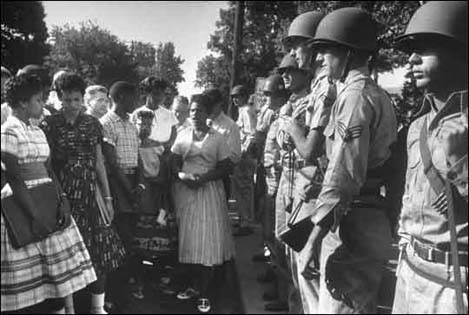
That night, the president of the United States, Dwight Eisenhower, took control. “An extreme situation has been created in Little Rock,” he said. “This challenge must be met, and with such measures as will preserve to the people as a whole their lawfully protected rights.”
He ordered units from the 101st Airborne Division to Little Rock. They were there by dawn on September 24, 1957. The next day, soldiers escorted the nine students through the front door and into their classrooms.
I’ve got nothing but time to sit and absorb the words. Toward a more perfect union. It suggests unfinished business, a path we still need to follow, things that will require all of us working together to accomplish. I realize as I sit here that for the past few days I’ve been focused most on the geography and the weather but in the process I’ve also entered new territory as has Obama. I’m in the South now though it is very difficult to know that from appearances. Fayetteville is not only a beautiful city but with the university sitting in its midst, a cross-cultural one as well. Would this be true in other parts of the south?



